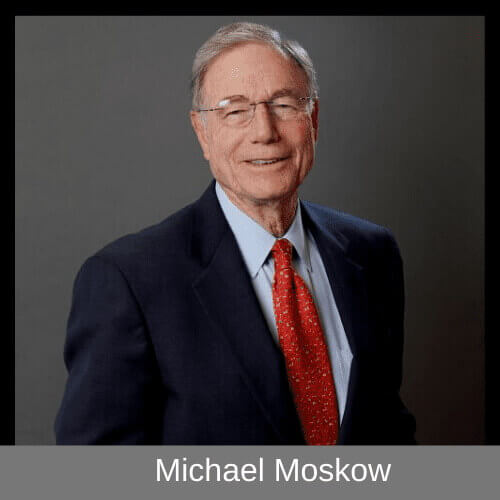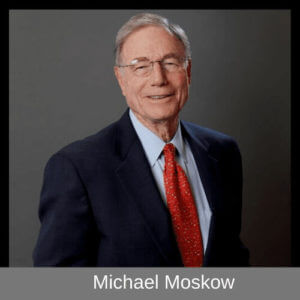
Ep. 69 - Michael Moskow is a manager personified. Michael's professional accomplishments include service in both the public and private sectors, as well as higher education. During the course of his career, he has been confirmed by the U.S. Senate for five positions in the federal government. Like Carla Hills, he has worked for HUD and been a U.S. Trade Ambassador. He covers a wide range of topics from a reconnaissance mission touring dangerous public housing projects in the 1970's to comparing differences in management from the public to private sector to receiving Japan's honorable award, "The Order of the Rising Sun; Gold and Silver Star." He even educates us on the role of the Federal Reserve Bank.
Top Takeaways:
-
- Understanding why government programs tend to continue longer than they're worthwhile and are difficult to cancel
- Understanding why private programs get flushed out when they fail to meet economic expectations
- The importance of management styles and culture within an organization to keep it successful
- The importance of making serious efforts to develop programs to help workers transition to other jobs when laid off due to new trade
- Why leaders need to be agile to survive in the unprecedented pandemic times and a possible global inflation
Listen in to learn the importance of and developing programs to help workers transition to other jobs when new trade leads to layoffs.
"Long term economic growth will be slower because of slower population growth in most industrialized countries." -Michael Moskow
GOVERNMENT SERVICE MANAGER
From 1969 to 1977, Michael Moskow held a number of senior positions with the US government, including Under Secretary of Labor at the US Department of Labor, Director of the Council on Wage and Price Stability, Assistant Secretary for Policy Development and Research at the US Department of Housing and Urban Development, and Senior Staff Economist with the Council of Economic Advisers.
PRIVATE SECTOR MANAGER
In 1977, he joined the private sector at Esmark, Inc. in Chicago and later held senior management positions at Northwest Industries, Dart and Kraft, Inc., and Premark International, Inc., a spin-off from Dart and Kraft.
TRADE AMBASSADOR
In1991, President George H.W. Bush appointed Mr. Moskow deputy United States trade representative, with the rank of ambassador. He was responsible for trade negotiations with Japan, China, and Southeast Asian countries as well as industries such as steel, semiconductors, and aircraft.
FEDERAL RESERVE BANK
From 1994 to 2007, he served as president and chief executive officer of the Federal Reserve Bank of Chicago. In that capacity, he was a member of the Federal Open Market Committee, the Federal Reserve System's most important monetary policymaking body.
INTERNATIONAL
He is the Vice-Chair and Distinguished Fellow for the Global Economy, The Chicago Council on Global Affairs.
ACADEMIA
He began his career teaching economics, labor relations, and management at Temple University, Lafayette College, and Drexel University.
Michael Moskow returned to academia in 1993, joining the faculty of the J.L. Kellogg Graduate School of Management at Northwestern University.
EDUCATION
He received an A.B. in economics from Lafayette College in Easton, Pennsylvania and a Ph.D. in business and applied economics from the University of Pennsylvania. He has received honorary doctoral degrees from DePaul University, Dominican University, Lafayette College, and Lewis University.
BOARDS
Since leaving his position at the Federal Reserve, Moskow joined the boards of directors of Discover Financial Services, Commonwealth Edison (a subsidiary of Exelon), the National Futures Association, Northern Funds (2008-2013), Taylor Capital Group (2008-2014), and Diamond Management & Technology Consultants (2008-2010). He is a member of the advisory boards to the Chicago Mercantile Exchange, Edgewater Funds, and Promontory Financial Group.
AWARDS
In addition to receiving three honorary degrees, he was awarded the Addams Palmer Award for Exemplary Civic Involvement by the Civic Federation of Chicago, the Business Professional of the Year Award by Harold Washington College, the Financial Executive of the Year Award by DePaul University, and a distinguished alumnus award from Lafayette College.
Learn why public programs run for longer than they need to while private programs run their course.
Key Moments
Michael explains how government agencies vary from one to the next, plus the complexities of different government jobs that exist [3:53]
He describes working with Jim Lynn and Carla Hills at HUD and other government branches [8:25]
How different groups within the same department were combined in one unit called the PD&R [11:29]
He talks about some of the challenges he faced at HUD which ranged from bringing people together, units, and organizations and even developing a culture [13:29]
The recommendations that the housing tax force made in new and existing housing [15:24]
Michael explains the importance of high performing culture in any private organization that he learned during his 14 years in the sector [23:59]
Why the private sector management perform better than the public sector [27:39]
He describes the trade issues negotiations agreements he carried out with Japan, European Union, and the Chinese in the 1990s as an ambassador [28:44]
He talks about the award handed to him by the the Prime Minister of Japan [33:27]
He discusses his experiences and legacy in culture change during his time at the Federal Reserve Bank of Chicago [34:58]
Michael's role as the Vice-Chair and Distinguished Fellow for the Global Economy [40:45]
The challenges of the pandemic and possible global inflation that leaders today have to deal with [42:30]
RESOURCES
Federal Reserve History: Michael Moskow
https://www.edgewaterfunds.com/about-us/michael-h-moskow/
Michael Moscow on American Hero Paul Volcker
